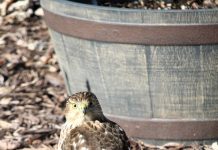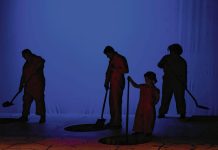eeing a Christian pastor clad in official vestments or robes while leading a worship service is one thing. Seeing them afterward in jeans enjoying good-natured humor with others is another thing altogether.
Just ask Columbus’ Sharif Aljoaba. He’s a member of the Islamic Society of Columbus Indiana, slowly familiarizing himself with the local Christian population.
“I never fully expected a pastor in a church to be such — well, to be such a cool guy,” Aljoaba said, laughing.
He referred to the Rev. Scott Hill, pastor at Columbus’ First Presbyterian Church.
[sc:text-divider text-divider-title=”Story continues below gallery” ]
Hill and Aljoaba are the new facilitators of an informal 16-member Christian-Muslim dialogue group that formed in January. The two acknowledge the group has opened eyes and opened hearts of both faith communities — and solidified common ground between the two.
Members have gathered eight times, including at worship services at the local mosque, at St. Bartholomew Catholic Church, North Christian Church and Hill’s church. With the help of group planner David Harpenau of St. Bartholomew, organizers have used materials from the national Just Faith ministry’s Just Matters program to give the local effort a foundation.
Marwan Wafa, among the most visible local Muslims and one of the group’s facilitators until last month, said he remembers that he was visiting his parents in Canada when he got a phone call in August last year. Someone told him that the exterior of three local Christian churches — St. Bartholomew, East Columbus Christian and Lakeview Church of Christ — had been spray-painted with graffiti, including some Islamic or Quran references and terminology.
The Quran is the Muslims’ holy book. Wafa has seen the messy ugliness transformed into beauty.
“People — whoever it was — committed an evil act among our faith families apparently in an attempt to drive a wedge between us,” Wafa said. “But we have used the situation to learn to love and respect each other even more.”
And to build everyday friendships.
For instance, one of the group members is hosting an upcoming cookout — and inviting co-members to his house. Already, dialogue participants have shared meals together.
Steve Heimann, with Wafa another of the original facilitators, mentioned that finding common ground has been a key.
“It’s important to learn about all those things we share,” Heimann said. “We all believe in a monotheistic God, though Christians also believe he is three persons in one. And we’re all descendants of Abraham.”
Hill lived for years in places such as Morocco and Egypt, where the Muslim population is substantial. But he said even he has learned plenty since January.
“The biggest thing for me has been to realize how many holy figures and holy stories and elements we share,” Hill said. “And I didn’t realize that there’s more about (Jesus’ mother) Mary in the Quran than in the Bible.”
Aljoaba, who was born and lived for years in Palestine, an area where Muslims and Christians regularly mix, said his involvement has shown him far more detailed complexity of the Bible than he ever knew.
Heimann said his new relationships with Muslims has shown him that Islamic women “are not subservient,” as he has felt media and other reports sometimes have shown.
Hill pointed out that the learning has included facing differences and “discussing the hard topics (amid the faiths). If you don’t do some of that, you have a nice, fake relationship.”
After one of the worship services, group members took questions about the faiths from those who attended. Amid such activities, a bond began to form far beyond the facets of faith, as Heimann sees it.
“We were getting to know each other as human beings,” Heimann said.
After several months of fellowship, Wafa has been reminded how even the simplest practice of sharing faith has served to educate all involved. He repeated a mantra that he has used in nearly every interview and presentation about faith and cultural diversity during his time in Columbus.
“The worst enemy of mankind,” Wafa said, “is ignorance.”
Perhaps a good message to share just about anywhere.
[sc:pullout-title pullout-title=”The group’s plans” ][sc:pullout-text-begin]
The Christian-Muslim dialogue group in Columbus plans to:
- Create a group of people to serve as a cultural resource to local Muslims sometimes placed in an environment very different than what they may be accustomed to.
- Further enhance understanding of each faith locally.
- A joint worship service of some sort and an upcoming open house gathering.
- A community exhibit, set in a public space, highlighting aspects of the Christian and Muslim faiths and highlighting commonalities.
[sc:pullout-text-end]




